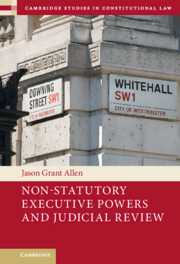Book contents
- Non-Statutory Executive Powers and Judicial Review
- Cambridge Studies in Constitutional Law
- Non-Statutory Executive Powers and Judicial Review
- Copyright page
- Dedication
- Contents
- Acknowledgements
- Table of Cases
- 1 Introduction
- 2 Official Action beyond Statute
- 3 The ‘Third Source’ in the Courts
- 4 A Unified Category of ‘Non-Statutory Executive Powers’
- 5 The Crown as Corporation
- 6 Public Law as the Law of Public Offices
- 7 Office in Action
- 8 Approaching Judicial Review
- 9 Competence, Conduct, and Validity
- 10 Moving beyond the Ultra Vires Debate
- 11 The Common Law Theory of Ultra Vires
- 12 The Borders of the Supervisory Jurisdiction
- 13 The Normative Foundations of Judicial Review
- Index
6 - Public Law as the Law of Public Offices
Published online by Cambridge University Press: 18 August 2022
- Non-Statutory Executive Powers and Judicial Review
- Cambridge Studies in Constitutional Law
- Non-Statutory Executive Powers and Judicial Review
- Copyright page
- Dedication
- Contents
- Acknowledgements
- Table of Cases
- 1 Introduction
- 2 Official Action beyond Statute
- 3 The ‘Third Source’ in the Courts
- 4 A Unified Category of ‘Non-Statutory Executive Powers’
- 5 The Crown as Corporation
- 6 Public Law as the Law of Public Offices
- 7 Office in Action
- 8 Approaching Judicial Review
- 9 Competence, Conduct, and Validity
- 10 Moving beyond the Ultra Vires Debate
- 11 The Common Law Theory of Ultra Vires
- 12 The Borders of the Supervisory Jurisdiction
- 13 The Normative Foundations of Judicial Review
- Index
Summary
This chapter presents a concept of office as the central, organising concept in public law. Public law is, effectively, the law of public offices. An office is a stable, institutionalised social role tantamount to an artificial legal person that is occupied by a person from time to time in virtue of which that person acts ‘outside themselves’ and for the political community as a whole. This is the key to understanding the law of judicial review, which is uniquely concerned with this official mode of action. The concept of office has languished at the margins of public law theory since the nineteenth century reform of the English civil service. Its reinstatement is essential to understand the judicial review of official action beyond statute, and would reinvigorate and enrich public law theory more broadly as well – up to and including the foundation of a powerful conception of the rule of law.
Keywords
- Type
- Chapter
- Information
- Non-Statutory Executive Powers and Judicial Review , pp. 114 - 146Publisher: Cambridge University PressPrint publication year: 2022

